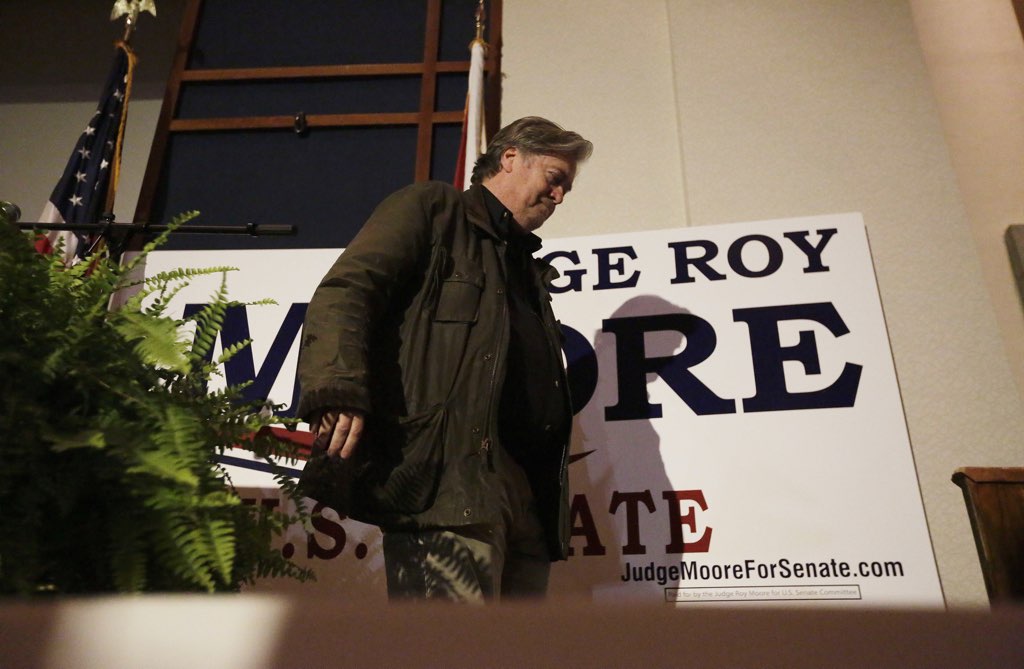Tuesday’s Alabama Senate Republican primary run-off laid bare those dichotomies so delicious of late to political reporters: Trumpism versus Mitch McConnell‘s swamp, soulful invective versus the tyranny of political correctness. Ultimately, the outsider versus the establishment.
Or, at least, that’s how Breitbart would have you see it.
Steve Bannon, the head of the rightwing website and former White House chief strategist, took the stage Tuesday evening in Montgomery to congratulate Roy Moore on his victory. The former Alabama Chief Justice had trounced Luther Strange, the incumbent and President Trump’s pick, by roughly 10 points. But for Bannon, the evening was about much more than Moore; his eyes gleamed as he spoke of “starting a revolution” with the embattled judge’s triumph, declaring the election a referendum on the power of “the people” over “the money.” It was good news for the likes of Paul Nehlen and Chris McDaniel, who joined Bannon at a rally for Moore in Fairhope the night before; the insurgent-style candidates have spectacularly failed in their attempts to unseat their respective establishment targets, and if Bannon was correct that a revolution was underway, they would surely be the next to benefit.
For many reporters, Bannon’s statements were candy; when it came to constructing a narrative, a digestible means of understanding this race and its implications at the national level, he had done the work for them. I watched on Twitter as the evening’s through-line formed: Moore’s victory augured an establishment upheaval in 2018, the collapse of McConnell’s well-oiled machine, all at the behest of Bannon and his Breitbart cohorts. (I fell for it, too, asking a source close to Bannon what this meant for Mississippi’s US Senator Roger Wicker, and dutifully tweeting their doomsday response.)
Yet there was little evidence to suggest that Moore’s win was in fact a symbol of the outsider-versus-establishment design, or even that Bannon had much to do with it. Ultimately, Moore succeeded through old-fashioned politicking, which is to say he captured voters’ imaginations. Unluckily for Strange, he did so several years ago, in 2003, when, as Alabama’s chief justice, he defied a federal order to remove a wooden tableau of the Ten Commandments outside the state’s judicial building, one that he himself had commissioned as circuit judge. The importance of that moment as the foundation of Moore’s electoral brand, as a stamp in the minds of hundreds of thousands of voters, cannot be overstated.
And then there was Strange, whose brand—if he even had one—was tethered to Robert Bentley, the disgraced governor who resigned earlier this year amid a sex scandal. Many felt that Strange—who, as attorney general, was ostensibly tasked with investigating Bentley’s affair—earned his appointment to Jeff Sessions‘s seat in exchange for taking it easy on the governor (“Dr. Love,” as he’s called). Evangelicals across the state felt personally betrayed by Bentley, a church deacon who promised to cut through the corruption that has for so long pockmarked Alabama politics; ultimately, a vote for Strange would have been akin to affirmation of what they saw as the moral darkness of Bentley’s tenure.
There were thus two key questions at work for most voters. The first, the one that so often dictates Alabama races: Who loves the Lord more? The second: Who is furthest from Robert Bentley? Moore, it seems, was the easy answer to both.
But Bannon! Breitbart!
There is, yes, something much sexier to the idea that Bannon and his team swooped into Montgomery and sparked the defining surge for Moore. It sets up some fun dynamics—President Trump, who backed Strange, taken to task by his former wingman; Breitbart gearing up for “war,” just as Bannon had promised; a cast of Republican incumbents soon to fall like dominoes. It’s also just plain easier to write: by this point, every political reporter knows how to punch out a story on the so-called GOP civil war, with all the “simmering tensions” and “fever breaks” and “political tremors” that define it. But in our perpetuation of that narrative, especially after elections that prove it’s not even half the story, reporters continue to give folks like Bannon ample, if undefined, evidence of Breitbart’s clout. The result is that Breitbart, a site that touts its extra-Beltway bona fides, owes Washington for its ever-growing mythos.
The truth may be, though, that Breitbart is just a popular website, and the outcome of a “bellwether” election had much more to do with Jesus and a shitty governor. That may not be as fun a story, as national a story, but it is, much more crucially, the real story. As we barrel into midterms, it’s the one we should try to tell.




















